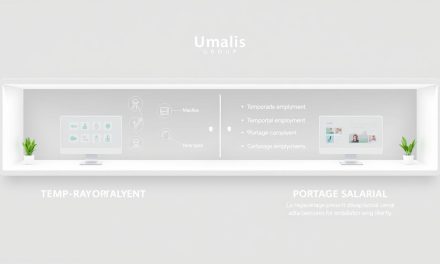In France, employee benefits blend legal protections and competitive extras that shape daily life at work. This guide explains how mandatory rules like Social Security and employer-paid mutuelle sit alongside perks such as meal vouchers, flexible schedules, and equity offerings in tech.
Facts matter: two out of three employees in France say they would leave for a better package. Many employers now offer hybrid or remote options, and tech companies often include equity and learning budgets.
Beyond base salary, these elements raise total compensation by turning employer-paid items into clear euro value. Understanding statutory entitlements and voluntary add-ons helps candidates compare offers and negotiate smarter.
Use this guide to spot mandatory coverage, private health top-ups, leave rules, retirement and transport support, and the extras that improve daily life. Pay attention to how each item is funded and accessed — that detail makes the difference when evaluating a company package.
Table of Contents
Key Takeaways
- Employee benefits in France mix law-driven protections with competitive add-ons.
- Perks often increase total compensation more than a small salary bump.
- Tech firms lead on equity, remote work, and learning budgets.
- Look past labels to funding, eligibility, and real cost savings.
- Use this guide to benchmark offers and negotiate with confidence.
What “job benefits” really mean today for job seekers in France
For many candidates in France, the full compensation picture matters more than the base pay.
From salary to total compensation: why benefits matter
Employee benefits now form a clear share of an offer’s value. Health coverage, leave, and flexibility shape daily life and retention.
Employees look beyond pay to judge how a role supports family life, learning, and long-term security.
Seven core categories of employee benefits
Use a simple checklist to map packages across seven areas. This helps compare companies and spot gaps fast.
| Category | What it covers | Estimated annual value | Ease of access |
|---|---|---|---|
| Financial & Retirement | Salary supplements, pensions | €1,000–€5,000 | Medium |
| Insurance | Health insurance, provident | €500–€2,000 | High |
| Time Off | Vacation, sick, parental, RTT | €1,200–€3,000 | Varies |
| Flexibility & Wellness | Remote, stipends, EAP | €300–€1,500 | High |
Remember: Social Security underpins many plans in France, and employers often top it up with private cover. Employees must read eligibility rules and enrollment windows to avoid missing key protection.
Mandatory employee benefits in France you should expect on day one
A clear day-one checklist helps every new employee know what must be in place.

Paid time off, sick and parental leave
Legal paid time, sick leave, and parental leave are anchored to Social Security rules. Entitlements vary by situation, but workers receive basic paid days and coordinated refunds from the state.
Private health insurance (mutuelle)
Employers must offer private health insurance and fund at least 50% of the premium. Under SYNTEC the base is €47/month, with the employer paying €23.50. Opt-out is restricted to specific cases only.
Retirement contributions
Contributions flow to the state pension and a company-linked supplementary pension determined by the APE code. This split shows where each amount is allocated for retirement planning.
| Feature | Minimum on day one | Typical rule |
|---|---|---|
| Transportation | 50% public transit reimbursement | Optional sustainable mobility schemes |
| Occupational health | Prevention visit within 3 months | Paid time and travel for exams |
| Termination indemnity | 1/4 monthly salary per year (first 10 yrs) | Continuation of cover up to 12 months |
Companies with 50+ workers must implement profit-sharing. Employees must verify enrollment, contributions, and timing in their offer and onboarding documents to ensure full compliance.
Private health insurance in France: how mutuelle complements Social Security
A mutuelle sits on top of Social Security to cover the gaps left after state refunds. Social Security typically reimburses around 70% of routine costs and up to 100% for long-term care. The complementary plan reduces out-of-pocket spending for visits, prescriptions, dental, and specialist care.
Typical employer vs. employee cost splits under CBAs
By law, employers must fund at least 50% of the mutuelle premium. Under SYNTEC the base premium is €47/month, with the company paying €23.50 and the employee €23.50.
That employer share is a tangible part of total compensation. Multiply the monthly amount by 12 to see the annual value when you compare offers from different companies.
Adding dependents, dental/vision, and opting out rules
Children are usually included in base coverage. Adding a spouse or partner often requires an upgraded plan at the employee’s expense. Typical upgrades (including dental and vision) can reach €77/month, deducted from net pay.
- Opt-out is strict: allowed only for pre-2016 hires, those covered by a spouse with yearly proof, or fixed-term contracts under 12 months.
- Always read the plan booklet for co-pays, exclusions, and exact reimbursement rates before you accept an offer.
Beyond the basics: optional employee benefits French companies offer to attract talent
Many French companies now use extra perks to stand out when hiring top talent.
Flexible working models dominate offers: about 90% of employers grant hybrid options and 36% list fully remote roles. Some firms add time-limited « work-from-anywhere » weeks to support travel or family needs.

How RTT, learning and meals work
RTT converts overtime into extra leave. Roughly 79% of companies offer RTT, often capping at about eight extra days per year.
Learning perks are common: 76% fund training, language classes, conferences, or coaching to boost long-term compensation and team skills.
Meal support ranges from canteens to lunch vouchers. Employers typically pay up to 60% of a voucher, with social-exemption up to €6.70 per ticket, making daily meals affordable.
Equity and wellness
Startups often use BSPCE or stock options to reward workers as the company grows. Vesting schedules vary, so ask about timelines.
| Perk | Typical coverage | Prevalence | Why it matters |
|---|---|---|---|
| Flexible working | Hybrid / remote / occasional WFA | 90% / 36% | Improves retention and work-life fit |
| RTT (extra days) | Overtime converted to leave | 79% | Adds up to ~8 days/year |
| Learning & L&D | Budgets, courses, coaching | 76% | Builds skills and internal mobility |
| Meals & wellness | Vouchers, canteens, EAPs | 57% / 50% | Daily savings and mental health support |
Ask how a company organizes home-office allowances, co-working budgets, or internet subsidies. Compare packages across the industry and weigh them against your personal goals to choose the best offer for employees.
For more on remote arrangements, see remote work opportunities.
How to evaluate a compensation package: putting a euro value on benefits
Put numbers on each element of an offer to see its real worth.
Assign monetary value to insurance, leave, and retirement
Add the employer-paid mutuelle share to yearly pay: monthly company contribution × 12. Include any extra personal top-ups.
For retirement, estimate employer payroll contributions to basic and supplementary plans and add them to the package amount.
Meals, transport and time off
Value meal vouchers by: voucher value × employer share × number per week × 52. Use the €6.70 tax-advantaged cap where relevant.
Compute transportation as 50% of an annual pass (or 100% if offered). For extra leave or RTT, divide annual salary by working days to price each paid day.
Remote stipends and home office costs
Total one-off office budgets, monthly stipends, and internet/electricity subsidies (42% benchmarks for office budgets; 18% for internet aid) to get a yearly figure.
- Tip: Record recurring monthly amounts and one-off sums separately.
- Tip: Sum everything for an annual compensation total and use a simple spreadsheet to compare offers and negotiate with clear numbers.
Maximizing health coverage: strategies to optimize mutuelle and provident insurance
Understanding how private cover and Social Security interact prevents unexpected costs after a claim.
Compare tiers by service, not brand. Look at reimbursement rates for GP visits, specialist care, dental and optical. Check ceilings, waiting periods, and exclusions that reduce real value.

Ask whether adding a spouse or children raises monthly costs more than likely annual claims. For many workers, an upgraded plan pays off only if expected care or dependents make claims each year.
Provident insurance: what it protects
Prévoyance covers income during long-term disability and provides lump sums linked to death or severe incapacity. Managers must have this cover; some collective agreements extend it to other categories.
If a manager dies without proper cover, the employer may owe a serious sum (three times the annual Social Security ceiling). That rule underscores why companies often maintain broad prévoyance schemes.
| Cover area | Typical payout | Who is usually covered |
|---|---|---|
| Short-term incapacity | Partial salary replacement | All employees (per CBA) |
| Long-term disability | Monthly income up to a cap | Managers + many workers |
| Death / survivor | Lump sum or pension | Managers; expanded by some CBAs |
« Read the plan summary and claims record before upgrading — past utilization shows real-world value. »
- Coordinate Social Security refunds with the mutuelle to close gaps.
- Request plan booklets and previous-year utilization data from your employer.
- Reassess coverage after major life changes: marriage, children, or retirement planning.
Good coverage reduces large, unpredictable costs and protects family income. Small extra premiums can be useful when they prevent a major out-of-pocket bill or preserve retirement and pension planning.
Flexible working and work-life balance: where French employers go beyond the minimum
A shift toward hybrid and remote routines is changing daily rhythms for many employees in France.
Trends: hybrid work is now the default at about 90% of companies, while 36% offer fully remote roles. Skeelz research shows strong appetite for a four-day week (71%) and flexible hours or remote options (64%). These changes give employees real time back and reduce commuting stress.
Practical support for remote setups
About 42% of companies offer a home office allowance. Many also provide co-working budgets and limited work-from-anywhere windows (21%).
Around 18% subsidize internet and electricity to offset incremental costs. These measures help teams stay productive and protect employee health by funding ergonomic gear and reliable connections.
Making flexibility work for teams
Managers keep flexible arrangements sustainable with clear goals, asynchronous communication, and agreed core hours. Employees should confirm how hybrid days affect transportation reimbursements and track saved time and costs from less commuting.
« Treat flexibility as a trust-based pact: deliver reliably and communicate clearly. »
- Evaluate flexible hours against team rhythms and client needs.
- Check if office days still trigger transportation support.
- Count stipends and savings when comparing offers; they add clear euro value over time.
Special situations: parents, high-risk roles, and international hires
Special circumstances often change how companies support employees at key life moments. Employers can top up statutory parental leave with extra paid days, weeks, or even a month to help family bonding and a smoother return to work.
Parental leave enhancements
Ask whether the company offers additional childcare days, emergency leave, or a stipend for school transitions. Some employers also give flexible schedules during the first months back to ease the shift for parents and children.
Medical surveillance and return-to-work
High-risk roles require enhanced occupational health checks. Pregnant employees and workers returning after 30+ days of illness often follow a structured medical review and phased return plan.
These safeguards protect the worker and the team by reducing recurrence and ensuring duties match fitness to work.
Relocation, visas and cross-border work
Many companies offer relocation packages, visa sponsorship, and onboarding help. Tech firms increasingly allow structured cross-border remote employment, but employees must verify tax and benefits eligibility first.

- Check if commuting is reimbursed at 100% for specific transport passes — this can cut costs for hybrid workers.
- Coordinate leave across the team to maintain service levels while offering compassionate flexibility.
- Plan housing, schools for children, and admin steps early when relocating; align timelines with company onboarding.
« Compare special situation policies between companies to ensure your chosen employer supports family and career plans. »
Negotiating job benefits with French employers
A clear, evidence-based ask can turn standard terms into meaningful support. Start by separating what is fixed by law or a collective agreement from what is open to discussion.
What’s negotiable vs. set by law or CBA
Non-negotiable: mutuelle minimum shares, pension contributions, transportation reimbursement, occupational health rules, and profit-sharing rules for larger firms.
Negotiable: extra paid days, higher employer mutuelle share, L&D budgets, remote stipends, meal vouchers, equipment and co-working allowances.
Make data-backed asks
Use market norms to argue your case: reference hybrid prevalence, typical RTT, and common meal voucher shares. Prioritize two or three high-impact items—extra leave, a larger insurance contribution, or a clear L&D fund—rather than pushing multiple small changes.
Practical negotiation tips
- Propose measurable outcomes for flexible hours and agree core hours.
- Ask for structured L&D support: conference days, course budgets, or coaching time.
- Discuss variable pay: BSPCE, performance bonuses, or a 13th-month and weigh risk vs. upside.
« Respectful, evidence-based requests position employees as thoughtful partners and often win better terms. »
Document any agreement in writing and ensure company policies reflect the changes so employees must receive the promised compensation and support.
Conclusion
This guide helps employees put every part of an offer into clear euros and days so comparisons are simple and fair.
Check mandatory cover such as Social Security, mutuelle and retirement, then add transport, meal vouchers, and learning stipends to your yearly total.
Match what matters to your life stage—family, health, skill growth—and benchmark what employers and companies offer in your sector.
Quantify key items, list questions for HR, and negotiate remuneration confidently — see a practical guide to prepare at negotiate remuneration.
Review coverage and flexibility each year. Small employer improvements — a higher health insurance share, better transportation support, or extra learning days — can raise total compensation and strengthen team wellbeing.
FAQ
What does "total compensation" include beyond salary in France?
Total compensation covers salary plus employer-paid items such as private health insurance (mutuelle), retirement contributions, meal vouchers (ticket restaurant), transport reimbursement, paid time off, and any equity or long-term incentives like BSPCE. Companies may also add learning budgets, wellness programs, and remote stipends that increase the package’s cash-equivalent value.
Which employee protections and leave entitlements are mandatory from day one?
From the first day, workers in France benefit from statutory paid leave accrual, sick leave protections, and social security coverage. Parental leave rights, minimum notice periods, and contributions to the state pension system apply. Specifics can vary by collective bargaining agreement (CBA) or sector, so check the applicable convention collective for exact terms.
How does employer-provided private health insurance (mutuelle) work?
Employers typically must offer a complementary health plan that sits on top of Social Security reimbursements. Under many CBAs, the employer covers at least 50% of the premium. Employees can often add dependents or upgrade to better dental and vision coverage, though higher tiers may require extra employee contributions.
Who pays for the mutuelle and can employees opt out?
Most employers subsidize a significant share of the mutuelle premium, commonly around half, but the exact split depends on the CBA or company policy. Employees with equivalent coverage—such as through a spouse—may sometimes opt out if they provide proof of comparable insurance.
What retirement contributions should I expect from an employer?
Employers contribute to state pension schemes and to mandatory supplementary plans depending on the sector (ARRCO/AGIRC for private sector). Many firms also offer additional pension or savings plans that may include company contributions or matching, increasing long-term compensation and retirement security.
How are transportation costs handled by employers?
French employers must reimburse a portion of public transport season tickets (typically 50%). Many companies also provide sustainable mobility allowances, carpooling incentives, or subsidies for electric vehicle charging. Startups and multinationals often add bicycle or parking support.
What optional perks do French companies offer to attract talent?
Beyond legal requirements, firms often provide hybrid or fully remote options, RTT days for overtime, training budgets, language classes, meal vouchers, equity like BSPCE or stock options, employee assistance programs (EAPs), gym memberships, childcare support, and relocation packages for international hires.
How can I put a euro value on non-salary items when comparing offers?
Assign market costs to each perk—annual mutuelle subsidy, employer pension contributions, meal voucher face value, transport reimbursements, and the estimated cash-equivalent of leave days. Also include one-off allowances such as relocation or home office stipends to compare total compensation accurately.
What is RTT and how does it affect paid time off?
RTT (Réduction du Temps de Travail) grants extra days off to compensate for hours worked beyond the standard 35-hour workweek. Companies define accrual rules in contracts or CBAs; RTT can significantly increase annual paid leave compared to statutory vacation alone.
How do meal vouchers and canteens influence take-home value?
Meal vouchers (ticket restaurant) are partly tax-advantaged and often subsidized by the employer, which raises net disposable income. Onsite canteens offer subsidized meals at lower out-of-pocket cost. Both reduce daily living expenses and should be included when evaluating offers.
What is the role of provident insurance (prévoyance)?
Provident insurance covers long-term disability, critical illness, and death benefits above Social Security levels. Employers in certain sectors must provide minimum coverage, and many enhance plans to protect employees’ income and dependents during serious illness or accident.
Can I negotiate the employer share of mutuelle, leave top-ups, or L&D funds?
Yes. While some items are fixed by law or a CBA, employers often have flexibility on top-ups, additional paid leave, higher mutuelle contributions, or learning and development budgets. Back your request with data on market norms and the expected impact on retention and performance.
What should parents and high-risk role candidates check in an offer?
Parents should verify parental leave enhancements, childcare support, flexible hours, and any family-related allowances. Candidates in high-risk roles need details about medical surveillance, occupational health checks, enhanced provident insurance, and return-to-work arrangements after long illness.
How do CBAs like SYNTEC affect insurance and cost splits?
Collective bargaining agreements set minimum standards for many items—mutuelle minimums, provident coverage, and negotiated cost splits. For example, SYNTEC and other CBAs often define employer contribution ratios and coverage levels, so review the relevant convention to know what to expect.
What perks help remote workers cover home office costs?
Common supports include home office stipends, internet and energy subsidies, ergonomic equipment allowances, coworking budgets, and remote-work insurance. These reduce the personal cost of working from home and make flexible arrangements more sustainable.





